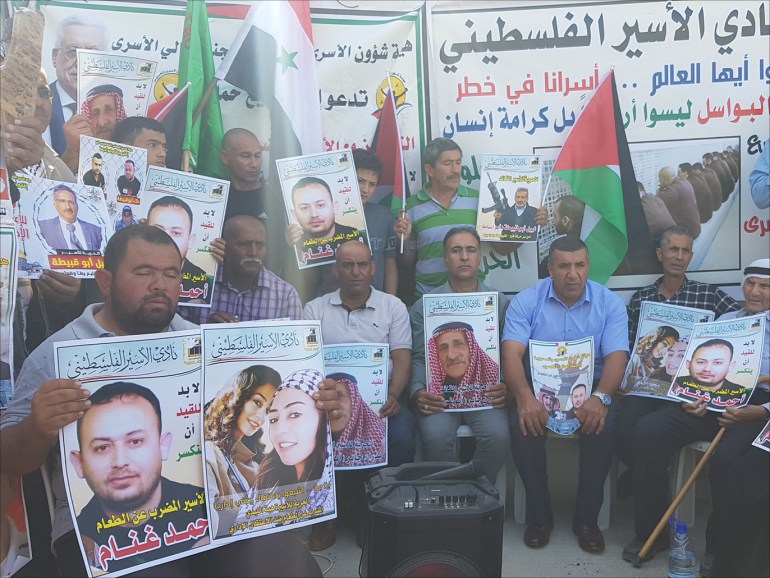Ramallah -
Since the announcement of the escape of 6 prisoners on Monday, the Israeli occupation prisons have witnessed a remarkable escalation against thousands of Palestinian prisoners, which on Wednesday developed into a violent attack on their sections in Gilboa, Shatta, Raymon and the Negev prisons, which witnessed the burning of 7 rooms. .
The Negev desert prison (southern of the country) is witnessing the most violent wave of repression, according to the Palestinian Authority's Prisoners Affairs Authority, which warned of a "disaster" inside Israeli prisons.
In conjunction with the Israeli escalation, Palestinian factions and forces called for sit-downs and demonstrations in solidarity with the prisoners in several Palestinian governorates, and this raises the question whether the occupied territories are on the brink of a new donation or not.
fierce attack
Hassan Abd Rabbo, the media official in the Prisoners and Ex-Prisoners Affairs Authority, described what is happening in Israeli prisons as "a very fierce attack characterized by criminality and hatred against the prisoners."
Abed Rabbo stated that today, Wednesday, 4 attacks were witnessed in 4 prisons, indicating that the most severe repression is taking place in the Negev prison in the south.
He explained that the prisoners "were subjected to assault, which prompted them to burn 7 rooms," noting that the Israeli repression units "tied the prisoners and brutally assaulted them."
In a rare event, according to the official in the Prisoners Authority, the Israeli Prison Authority summoned units of the Israeli army, armed with batons and batons, to suppress the prisoners and beat them in the Negev prison.
He added that "prisoners of Section 3 in Gilboa Prison (north) were also attacked, and others were transferred from it to other prisons after they were attacked."
The Shata prison (north of the Jordan Valley) witnessed tension, during which one of the prisoners threw hot water at a jailer, according to the Palestinian official.
The commission recorded the assault by the Israeli repression units in Raymond Prison (south of the country) on prisoners in 3 sections.
The Palestinian official described the conditions in the prisons as "catastrophic and retaliatory" after 6 prisoners managed to escape.
Consultations and popular movements
According to a previous statement today, Wednesday, by the Prisoners’ Affairs Authority, “rapid consultations between the movement’s leaders in prisons and detention centers led to an agreement to confront the attacks of the special repression units and the prison police by all means and methods.”
The commission called on "the international community and its institutions to take immediate action" to put an end to this Israeli madness" in dealing with Palestinian prisoners.
In several Palestinian governorates, including Hebron, Bethlehem, Nablus and Ramallah, factions, forces and popular movements called for demonstrations this evening, Wednesday and Thursday, in support of the prisoners.
The Palestinian National Liberation Movement (Fatah) also announced "the mobilization of its cadres in all organizational areas, and the expansion of the circle of engagement with the enemy in support of the prisoners."
The Palestinian prisoners face a massive Israeli attack in response to the success of 6 of them in escaping from Gilboa prison on Monday (Al-Jazeera)
Signs of explosion and confrontation
For its part, the Palestinian forces and institutions working in the field of prisoners and their defense held a meeting in the city of Ramallah (central West Bank), and approved a set of steps that will be announced according to developments in the situation inside prisons, according to the coordinator of the forces, Issam Bakr, told Al Jazeera Net.
Bakr said that the conditions in the prisoner's sections "warn of an imminent explosion that will not be in prisons alone, and the Palestinian street will not accept abuse and brutal repression against its prisoners."
He stressed that the situation inside prisons requires "the expansion of the popular movement to confront all this brutal attack from prison administrations."
Bakr spoke of a tendency to expand the popular movement so that it is not limited to city centers, "but includes points of friction with the occupation and its settlers, and cut off the bypass roads used by these people."
Bakr stressed that "the brutal attack by the prison administrations aims to withdraw the achievements that the prisoners took away through strikes that left martyrs among them, and to return the prisoners to what it was like in the late sixties of the last century, and this will not be allowed."
The coordinator of the Palestinian forces in Ramallah believes that events will move “towards a new wave, and that the Palestinian people will not leave their captives prey to the occupation attack, which is a reflection of a major failure in its security system, as its failure has been proven by liberating the six prisoners.”
It is noteworthy that the six prisoners who escaped from the Israeli "Gilboa" prison are all from the Jenin area (in the northern West Bank);
Five of them are from the Islamic Jihad movement, and they are: Munadil Nafi’at, Muhammad al-Ardah, Yaqoub Qadri, Ayham Kamanji, and Mahmoud al-Ardah, and the sixth is Zakaria al-Zubaidi, the former commander of the Al-Aqsa Brigades (the armed arm of the Fatah movement in the second intifada).
The number of Palestinian prisoners until the end of last August is estimated at 4,650, who are languishing in 23 Israeli prisons and detention and investigation centers, including 40 female prisoners, about 200 minors, and about 520 administrative detainees (without charge or release date), according to a report by the Palestinian Prisoners Club.

